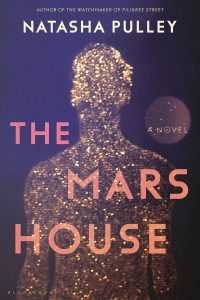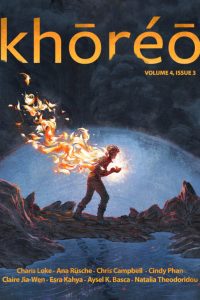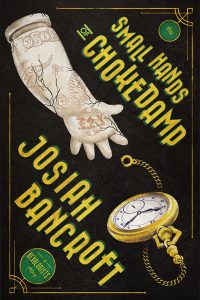Rich Horton reviews Short Fiction, September 2016
F&SF 7-8/16
Asimov’s 9/16
Clarkesworld 6/16, 7/16
Lightspeed 8/16
Beneath Ceaseless Skies 7/21/16
Lady Churchill’s Rosebud Wristlet 7/16
Swords v. Cthulhu, Jesse Bullington & Molly Tanzer, eds. (Stone Skin Press) August 2016.
 Lavie Tidhar offers perhaps the best novella of the year in the July/August F&SF. ‘‘The Vanishing Kind’’ is set in London in the 1950s, but in an alternate London where the Nazis won WWII, and are in control in England. The narrative strategy is perfect: the tale is told by a shady figure in the British Nazi government whose department keeps an eye on the protagonist, Gunther Sloam, a German screenwriter, who has come to London looking for Ulla, an actress who used to be his lover. He finds her trail hard and depressing to follow: she seems to be implicated in prostitution and drug-dealing, and along the way Gunther finds himself suspected of murder, and dealing with lowlifes, criminals, and even Jews, who are supposed to have been eradicated. The twists mount, and his quest leads him to a very dark place…. This is beautifully executed, capturing the noir style in pitch-perfect fashion, telling an exciting story while revealing pointed details of occupied British life, and resolving with the perfect cynical note.
Lavie Tidhar offers perhaps the best novella of the year in the July/August F&SF. ‘‘The Vanishing Kind’’ is set in London in the 1950s, but in an alternate London where the Nazis won WWII, and are in control in England. The narrative strategy is perfect: the tale is told by a shady figure in the British Nazi government whose department keeps an eye on the protagonist, Gunther Sloam, a German screenwriter, who has come to London looking for Ulla, an actress who used to be his lover. He finds her trail hard and depressing to follow: she seems to be implicated in prostitution and drug-dealing, and along the way Gunther finds himself suspected of murder, and dealing with lowlifes, criminals, and even Jews, who are supposed to have been eradicated. The twists mount, and his quest leads him to a very dark place…. This is beautifully executed, capturing the noir style in pitch-perfect fashion, telling an exciting story while revealing pointed details of occupied British life, and resolving with the perfect cynical note.
In the August Asimov’s, James Alan Gardner’s ‘‘The Mutants Men Don’t See’’ posits a particular means of genesis for superheroes: those who have the Spark gene suddenly develop powers if stressed enough during adolescence – something to do with wildly fluctuating hormones. Of course, not everyone has the gene, and teenagers being teenagers, those that want to become superheroes sometimes take terrible risks hoping to scare themselves into Sparking – and those without the gene often just die. Ellie has a teenaged son, and she is terribly afraid he’ll try something stupid in hopes of Sparking, so she tries to protect him…. It’s often a funny story, but also a wise one, with an ending that is easy to see coming, but satisfyingly so.
‘‘President John F. Kennedy, Astronaut’’, by Sandra McDonald, is a moving story set in a future ravaged by climate change. Pera lives with her mother and younger brother on a boat – an old amphibious ‘‘duck.’’ Their current job is taking an old man to a spot in the ocean: he claims that it’s the location of the old Vehicle Assembly Building at Cape Kennedy, where an alien artifact Kennedy found on the Moon has been hidden. He wants to recover it and the alien secrets it holds, but there are problems: two different ‘‘worst daughters,’’ for example, and a storm, and, to be sure, very plausible doubts about the old man’s wild stories about JFK’s astronaut career, not to mention his affair with Marilyn Manson, etc. Whatever the truth behind all that, the story works in evoking the wonder and the lost dreams of space travel.
The June Clarkesworld opens with a fine story by Margaret Ronald, ‘‘And Then, One Day, the Air Was Full of Voices’’, told by a researcher at an academic conference devoted to understanding the broadcasts from a star in Corona Borealis. It seems the broadcasts have ended, because the alien civilization has collapsed. The story suggests that the human response has been despair on the one hand, and loss of interest on the other hand – I admit I wasn’t quite sold on the extreme nature of the working out of both responses. But the more central part of the story movingly reflects on the key point of communication with aliens: ‘‘we are not alone’’ – and it suggests that we remember that indeed, we are not alone.
Sam J. Miller’s ‘‘Things With Beards’’ riffs on a rather scarier story about a form of alien contact, a story that has been successfully riffed on before, both in movies and an excellent recent Peter Watts tale. The title tells you which story, right? And hints at what Miller is doing, quite ambitiously, as his protagonist, a somewhat closeted gay man in the early ’80s, on returning from the Antarctic at the onset of the AIDS crisis, engages with a protest movement against police violence, and wonders what is happening to him when he forgets hours at a time. It’s interesting to see Miller using the metaphor of a shape-changing alien monster so bravely. It’s a worthwhile story to read, though in the end, I thought, not quite successful.
I should mention one other story, ‘‘The Snow of Jinyang’’ by Zhang Ran, if partly just for its loopiness. This appears at first to be a steampunk story set in China in the 10th century, complete with mechanically transmitted Internet and steam automobiles and lots of somewhat silly puns using present-day technical terms in something like a 10th-century context. It turns out to be another genre – Lest Darkness Fall, pretty much – with a more cynical edge, as a young man, an Internet gadfly, gets embroiled in events surrounding the siege of Jinyang and the mysterious Prince who is using marvelous inventions to prolong it – perhaps too long! This isn’t a great story, but it’s entertaining, different, and, as I said, rather loopy.
Clarkesworld’s July issue isn’t as good, with a set of decent but not great stories, the best of which is probably Chinese writer A Que’s ‘‘Against the Stream’’, about a man who begins to travel backwards in time, reliving his life in reverse, helping him understand what went wrong with his marriage, and offering him the hope of fixing it all if he can only reverse his condition. The conclusion is honest, but a bit pat.
In the August Lightspeed, I enjoyed Jeremiah Tolbert’s ‘‘Taste the Singularity at the Food Truck Circus’’, set in a somewhat climate-altered near-future Kansas City. The narrator is an accountant who once dreamed of being a chef, but now sublimates his ambitions to sampling food trucks. He runs into a guy he’d met at a cooking class long before, and ends up with an invitation to the Food Truck Circus, a not-quite-legal gathering where some truly wild food is offered (like modified tapeworms, that taste good and also consume some of the extra calories you’re ingesting). The plot is a bit slight, mainly concerning the ways the Circus discourages spies, and the resolution, if sensible, comes off a bit flat, but the story is amusing and the food ideas are fun.
Adam-Troy Castro’s ‘‘The Assassin’s Secret’’ is amusing as well, a slightly over the top tale of the world’s greatest assassin, who can kill with a stroke of his pen. Castro has a fair amount of fun describing his way of life, and his ways of death, but the center of the story is how the assassin deals with those who come asking for his services, and in particular the one secret he holds.
One of the reprints is worth mentioning as well: ‘‘The War of Heroes’’ by Kameron Hurley, which first appeared on her Patreon page this year. Yousra is a woman on a planet ravaged by invading ‘‘Heroes,’’ who ends up on something of a quest, eventually learning something of the Heroes’ motivation, and being offered a terrible choice. The story is effectively very weird – true SF but truly strange – and it has a deeply felt moral core.
In Beneath Ceaseless Skies for July 21, I liked a predictably exotic and violent and imaginative story from Benjanun Sriduangkaew, ‘‘Under She Who Devours Suns’’. Melishem returns to her birth-city, Tessellated Talyut, looking for her rival and friend, Sikata, only to find that she has died defending the city. So Melishem resurrects her – an ambiguous benefit – and tries to restore her memory and skills, for reasons that remain a bit obscure. The story is outwardly about the two women as warriors, and the telling focuses as well on pure strangeness, but at its true heart it is about friendship and love and duty.
The new issue of Lady Churchill’s Rosebud Wristlet features a fine, quiet sort of horror story, ‘‘Recursion’’ by Michelle Podsiedlik. A woman is visiting the mountain town where her brother had lived, for his funeral after his death in a fire. She unburdens herself to a man in the hotel bar, telling of her brother and his interest in this town and in particular its history, which began with an asylum… and things get more disquieting, even creepy, as her brother’s history and obsessions become clearer.
I’m not really that into Lovecraftian horror but Swords v. Cthulhu seemed to offer a bit more action, maybe a bit less cosmic despair, than usual, so I looked into it. It’s fair to say there’s still some cosmic despair on offer, but plenty of action, and a fair bit of fun. I particularly liked a couple of stories. Jeremiah Tolbert’s ‘‘The Dreamers of Alamoi’’, in which the madman Garen the Undreaming, who never sleeps and has a soul in shards as a result, is engaged by a brother and sister to go to Alamoi, where everyone who gets too close is mentally ensnared to work on a massive edifice, is good fun. The best thing about this, though, is Garen’s character. Caleb Wilson’s ‘‘Bow Down Before the Snail King!’’ is a strong, strange story, in which a certain courtier named Loron has heard of a treasure ‘‘hidden in the south.’’ The king assigns a small group led by Charop the Strategist, with the help of Ichneumon the Weird, to lead Loron to the treasure. Loron has his own plans – but so too does the Snail King! Again, it’s the main characters, the rather dour Charop and the truly weird Ichneumon, that make the story: I particularly liked the magic system portrayed, and the consequences of misusing it.
Recommended Stories‘‘The Mutants Men Don’t See’’, James Alan Gardner (Asimov’s 8/16)
‘‘The War of Heroes’’, Kameron Hurley (Lightspeed 8/16; Patreon)
‘‘President John F. Kennedy, Astronaut’’, Sandra McDonald (Asimov’s 8/16)
‘‘Things with Beards’’, Sam J. Miller (Clarkesworld 6/16)
‘‘Recursion’’, Michelle Podsiedlik (Lady Churchill’s Rosebud Wristlet 7/16)
‘‘And Then, One Day, the Air Was Full of Voices’’, Margaret Ronald (Clarkesworld 6/16)
‘‘Under She Who Devours Suns’’, Benjanun Sriduangkaew (Beneath Ceaseless Skies 7/21/16)
‘‘The Vanishing Kind’’, Lavie Tidhar (F&SF 7-8/16)
‘‘The Dreamers of Alamoi’’, Jeremiah Tolbert (Swords v. Cthulhu)
‘‘Bow Down Before the Snail King!’’, Caleb Wilson (Swords v. Cthulhu)






